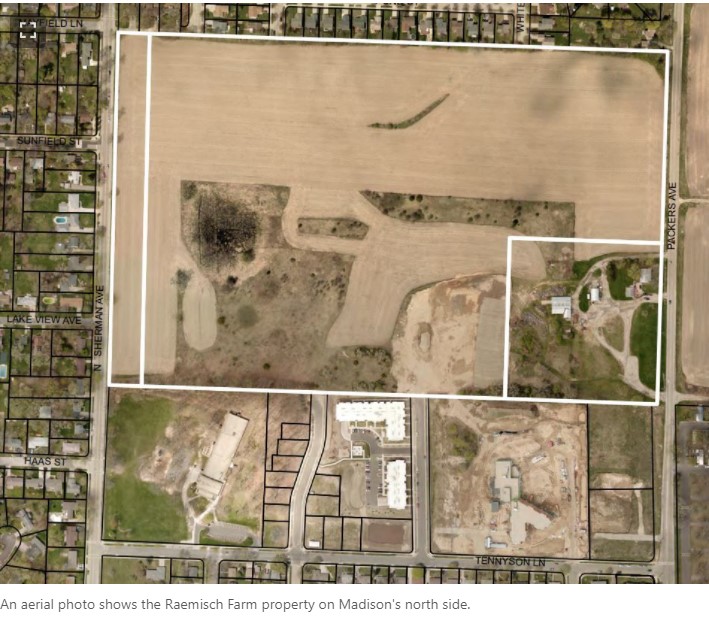Madison City Council rejects North Side farmland development over F-35 concerns
Logan Wroge | Wisconsin State Journal,l February 23, 2022
The Madison City Council has rejected for a second time a proposed farmland development on the city’s North Side, siding with neighbors who contend the property isn’t suitable for housing with the coming noise from F-35 fighter jets to nearby Truax Field.
The council late Tuesday killed a rezoning attempt on the approximately 64-acre property — known as Raemisch farm — where a St. Louis-based developer is seeking to build 96-single family houses, several multifamily buildings, parkland and other developments.
Before Tuesday’s meeting, neighbors filed a “protest petition” against Green Street Real Estate Ventures’ proposed development. They argued the potential residents would be subjected to unhealthy levels of noise from the jets.
The council voted 14-6 against rezoning the Raemisch farm property, which is situated between North Sherman and Packers avenue. Similar to when the council rejected the development last summer, the body turned down the rezoning request Tuesday in a way that would allow it to be refiled without waiting.
While much of the council’s opposition stemmed from not yet knowing the true noise levels of the F-35s, which are to begin arriving next year, the debate spanned a wide range of arguments.
A few council members expressed a desire to see urban agriculture remain at the site and spoke to farmland preservation in general. Others weighed the city’s urgent need for more housing versus environmental justice concerns. Ald. Charles Myadze, the representative of the project area since new district lines took effect in January, viewed the development as an opportunity for first-time homeowners on the diverse North Side, while Ald. Juliana Bennett compared the development’s proximity to the airport to “modern-day redlining.”
Vice President Arvina Martin, 11th District, called the discussion a microcosm of the weighty issues policymakers consider.
“We need a place to live, we need access to food, and we need air, water, all of these things,” she said. “It seems like they’re all clashing against each other.”
Recognizing the complexity of the decision, Martin said she was ultimately concerned about “putting housing in an area that could be damaging to the health of our citizens.”
Responding to the at times high-level debate and sensing the proposal’s ultimate failure, Mayor Satya Rhodes-Conway argued the council isn’t “grounded in reality” if it tries to dictate the direction of each development in Madison.
“I just ask as you think about the decisions that you make — whether it’s this one tonight or future decisions on future land use — we stay grounded in reality and what’s possible, while it’s important for us to have big ambitions, we be realistic about what we can do versus what landowners can do versus what developers can do,” Rhodes-Conway said. “Because I think we’re getting a little lost.”
Bennett, 8th District, called the mayor’s comments about being grounded in reality “condescending.” She said the “present reality” is the noise from the comparatively quieter F-16 jets currently based at Truax Field make living in the area “still kind of crappy.”
Several neighbors said there’s too much unknown about the actual noise impact of the F-35 jets to commit to using Raemisch farm as housing.
North Side resident Emily Krause said the F-16s already produce enough noise to shake her house and routinely wake her two young children up in their sleep.
“It is clearly harmful to them, would you want this to happen to your children?” she asked. “Please do not put other families in this position and endanger their health and safety.”
How they voted:
Against: Alds. Abbas, Benford, Bennett, Conklin, Currie, Evers, Figueroa Cole, Foster, Furman, Heck, Lemmer, Martin, Verveer and Vidaver.
For: Alds. Albouras, Carter, Halverson, Harrington-McKinney, Myadze and Wehelie.
Joel Oliver, managing director of development for Green Street, said the developer has made several changes in response to neighborhood feedback and concern.
Those include, he said, committing to not build homes on an eastern portion projected to experience average noise levels of 65 decibels or higher, preserving a forest for Lakeview Elementary School, reducing lot sizes, and working with a local nonprofit to explore urban agriculture uses.
Ald. Gary Halverson, 17th District, said Green Street went “above and beyond” in community engagement, arguing the council’s decision on its rezoning request could have larger implications on whether developers want to build in Madison.
“We really do want to encourage these types of developers to build in our city, we want this type of willingness,” he said. “This decision is more than Raemisch farm, it’s also what signal are we sending in the midst of the massive demand and lack of supply of housing.”
Last August, the City Council rejected the same proposal from Green Street on a 15-2 vote, largely to give a work group time to consider concerns about future noise from the F-35s. But members of that work group ultimately clarified they wouldn’t seek to prohibit new housing within a certain area around the airport, prompting Green Street to reintroduce the Raemisch farm proposal.

